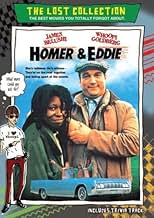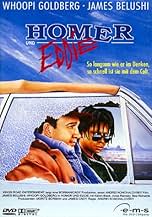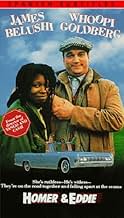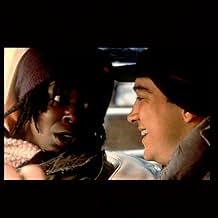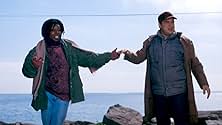NOTE IMDb
5,3/10
2,1 k
MA NOTE
Ajouter une intrigue dans votre langueA mentally disabled man gets help from a sociopath when he tries to reunite with his dying father, who years earlier disowned him.A mentally disabled man gets help from a sociopath when he tries to reunite with his dying father, who years earlier disowned him.A mentally disabled man gets help from a sociopath when he tries to reunite with his dying father, who years earlier disowned him.
- Réalisation
- Scénario
- Casting principal
- Récompenses
- 1 victoire et 1 nomination au total
Jim Belushi
- Homer Lanza
- (as James Belushi)
Jeff Thiel
- Twin #2
- (as Jeffrey Thiel)
Avis à la une
Let's see: a foul mouthed, violent murderer, thief, escaped mental patient dying from an inoperable brain tumor (Goldberg)is driving a witless, infantile, drooling wanderer who has severe and permanent brain damage (Belushi) home to see his ashamed, abusive father who completely disowned him years earlier. Sounds like a fun road trip picture, doesn't it?
Not even close. This movie was so vile that most theater chains passed on it, and those that didn't yanked it from their screens in less than a week.
It is not funny, even in the context of a black comedy. It is violent, disturbing, foul and completely off the entertainment meter in the negative values. I have yet to see this on any retail or rental shelf, or any cable or TV station, even during the graveyard hell populated by Psychic Fraud Network and Ronco Commercials.
Don't hitch a ride with these two. Your sense of humor may be permanently hijacked.
Not even close. This movie was so vile that most theater chains passed on it, and those that didn't yanked it from their screens in less than a week.
It is not funny, even in the context of a black comedy. It is violent, disturbing, foul and completely off the entertainment meter in the negative values. I have yet to see this on any retail or rental shelf, or any cable or TV station, even during the graveyard hell populated by Psychic Fraud Network and Ronco Commercials.
Don't hitch a ride with these two. Your sense of humor may be permanently hijacked.
Though it has been years since I have seen this movie, I remember it with affection and feel compelled to counter the sweeping dismissals of many reviews.
In the bone-hard truth of the desert, humanity is stripped down to persistence, interdependence, and hope and faith in the absence of a visible destination. The road is a trajectory for self-recognition, catharsis, and redemption. And so, just as the desert surprises us with life in the most unexpected places, Homer and Eddie surprise themselves.
Homer and Eddie are not that unlikely a couple. Neither has anywhere to go, figuratively or literally; so they keep on going. Neither has a future to look forward to, and yet each of them harbors hope. They do so because they are still alive, and moving and hoping are as basic to life as breathing. They did not choose each other's company, and they are no less prejudiced towards others for their own low station in society.
Though a road movie, `Homer and Eddie' it is not of the usual sort. Violence here is not redeemed by a `good cause' or an undercurrent of sex appeal; vile speech is not tempered by youth or good looks; and there is no romantic involvement to offer distraction. Homer and Eddie are not Thelma and Louise. They have more in common with Lennie and George in `Of Mice and Men', or with Josué and Dora in `Central Station'. Sidelined by society for crime, poverty, terminal disease and mental disability, Homer and Eddie begin their companionship by default. Eddie reluctantly looks after Homer, like a parent after a stranger's child. As she takes on responsibility for someone more helpless than herself, Eddie senses a reawakening of her capacity to care (in every sense) for another human being and, implicitly, for herself. By defending Homer's human dignity, she recovers her own. Though it will not avert her fate, the experience restores Eddie's humanity.
I found the film empowering because it takes its protagonists and their situation seriously. Homer and Eddie are not innocent. Nor are their shortcomings dismissible as picturesque, colorful, or cute. They don't try to be lovable; they simply are who they are. Their humor is that of people who believe they have nothing to lose. The film's perspective is level and from the inside out, not from the lofty perch of mainstream society. In that sense, it isn't judgmental, either, and so allows us to empathize with its outcasts. Their heroism is in their refusal to be victims, and in rising above their situation against all odds. This quiet and remarkably subtle piece is some of the best I have seen of Hollywood, and the tears I cried were those of joy and relief: No matter how low you sink in life, it is never too late to be a worthy human being.
In the bone-hard truth of the desert, humanity is stripped down to persistence, interdependence, and hope and faith in the absence of a visible destination. The road is a trajectory for self-recognition, catharsis, and redemption. And so, just as the desert surprises us with life in the most unexpected places, Homer and Eddie surprise themselves.
Homer and Eddie are not that unlikely a couple. Neither has anywhere to go, figuratively or literally; so they keep on going. Neither has a future to look forward to, and yet each of them harbors hope. They do so because they are still alive, and moving and hoping are as basic to life as breathing. They did not choose each other's company, and they are no less prejudiced towards others for their own low station in society.
Though a road movie, `Homer and Eddie' it is not of the usual sort. Violence here is not redeemed by a `good cause' or an undercurrent of sex appeal; vile speech is not tempered by youth or good looks; and there is no romantic involvement to offer distraction. Homer and Eddie are not Thelma and Louise. They have more in common with Lennie and George in `Of Mice and Men', or with Josué and Dora in `Central Station'. Sidelined by society for crime, poverty, terminal disease and mental disability, Homer and Eddie begin their companionship by default. Eddie reluctantly looks after Homer, like a parent after a stranger's child. As she takes on responsibility for someone more helpless than herself, Eddie senses a reawakening of her capacity to care (in every sense) for another human being and, implicitly, for herself. By defending Homer's human dignity, she recovers her own. Though it will not avert her fate, the experience restores Eddie's humanity.
I found the film empowering because it takes its protagonists and their situation seriously. Homer and Eddie are not innocent. Nor are their shortcomings dismissible as picturesque, colorful, or cute. They don't try to be lovable; they simply are who they are. Their humor is that of people who believe they have nothing to lose. The film's perspective is level and from the inside out, not from the lofty perch of mainstream society. In that sense, it isn't judgmental, either, and so allows us to empathize with its outcasts. Their heroism is in their refusal to be victims, and in rising above their situation against all odds. This quiet and remarkably subtle piece is some of the best I have seen of Hollywood, and the tears I cried were those of joy and relief: No matter how low you sink in life, it is never too late to be a worthy human being.
Whoopi Goldberg-James Belushi road movie isn't very good, isn't well-directed, but it does have something. Wrongly advertised as a wacky comedy, "Homer and Eddie" is actually a surprisingly sensitive and light-on-its-feet drama about friendship. Mentally backward man (Belushi) partners with an escaped mental patient named Eddie (Goldberg) who also has a brain tumor and keeps thinking she sees Jesus going by. Sort of a tragic love story between two unfortunate people that life threw away. Both stars are just fine, but the sloppy editing shows signs of an indecisive captain of the ship, and the blue-collar rock music on the soundtrack is grating. Panned by the critics, I found several scenes between the leads to be moving and funny, and Belushi shows a wonderfully huggable side of himself with a lovely monologue at a funeral; this is his best performance to date. **1/2 from ****
OK, first thing: this movie is NOT a comedy, not by a long shot. It has funny parts, but it is not a comedy.
This is the best piece of acting you'll ever see from James Belushi and also one of Whoopi Goldberg's finest, unarguably.
The movie is touching, funny, sad, violent and breathtaking. So for anyone who hasn't seen it, see it!
This is the best piece of acting you'll ever see from James Belushi and also one of Whoopi Goldberg's finest, unarguably.
The movie is touching, funny, sad, violent and breathtaking. So for anyone who hasn't seen it, see it!
Let's start with the ugly just to get it out of the way. I think this movie would have been considered a cult classic on par with Harold and Maude if someone besides Belushi had played Homer. At times he seemed to fall out of character at others it just looked like he was an actor playing a retarded person and very rarely he seemed in character. It wasn't a role that could be pulled off by over-acting or playing bigger than life. This was a great role played by the wrong actor. Now the bad, the continuity and sound track distracted from the story, How would people recognize Homer if he had been gone since childhood and his parents had denied him? The times you were expected to suspend belief to forward the story or develop characters were too glaring and the music was out of sync with the moods.
But yet I gave it a 5 out of 10 because of the good. Whoopi who is not my favorite actress did everything with her character that Belushi could not do with his, and the story as a whole and what it was trying to convey about the cast-aways of society kept me watching to see the inevitable ending.
But yet I gave it a 5 out of 10 because of the good. Whoopi who is not my favorite actress did everything with her character that Belushi could not do with his, and the story as a whole and what it was trying to convey about the cast-aways of society kept me watching to see the inevitable ending.
Le saviez-vous
- AnecdotesBest buddies in this movie, Whoopi Goldberg and Jim Belushi previously appeared as rivals in Jumpin' Jack Flash (1986).
- GaffesWhen Eddie spots the red car at the produce stand and tells Homer to pull in there, she is in the back seat. After they pull in they show her sitting in the front seat.
- Citations
Eddie Cervi: Feelin' pretty good? Then let's go!
- Bandes originalesDown Home Jubilee
Performed by Susi Beatty
Written by Dennis Morgan, Spady Brannan & Susi Beatty
Produced by David Malloy
Courtesy of Little Shop of Morgansongs/Spady Music/S.G.P. LTD
Meilleurs choix
Connectez-vous pour évaluer et suivre la liste de favoris afin de recevoir des recommandations personnalisées
- How long is Homer and Eddie?Alimenté par Alexa
Détails
- Durée1 heure 40 minutes
- Couleur
- Mixage
- Rapport de forme
- 1.85 : 1
Contribuer à cette page
Suggérer une modification ou ajouter du contenu manquant

Lacune principale
By what name was Voyageurs sans permis (1989) officially released in Canada in English?
Répondre


